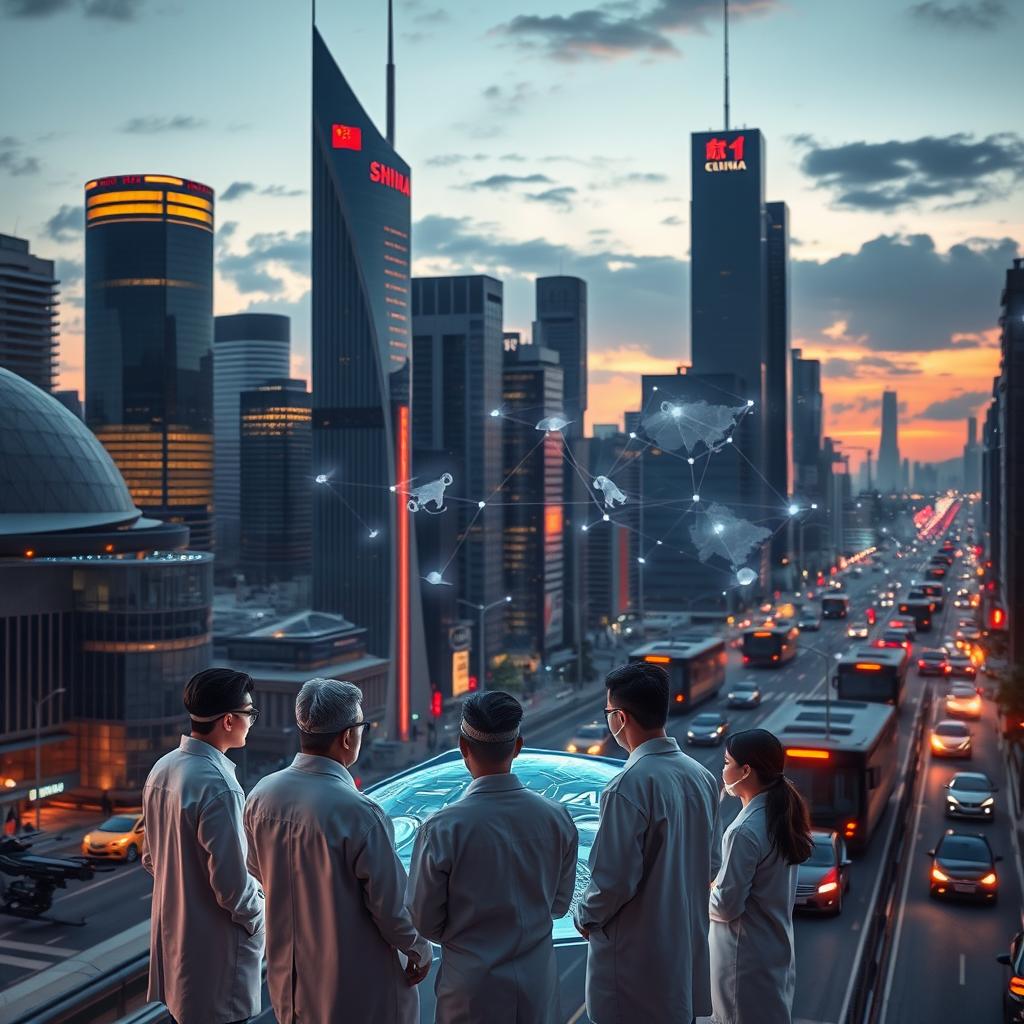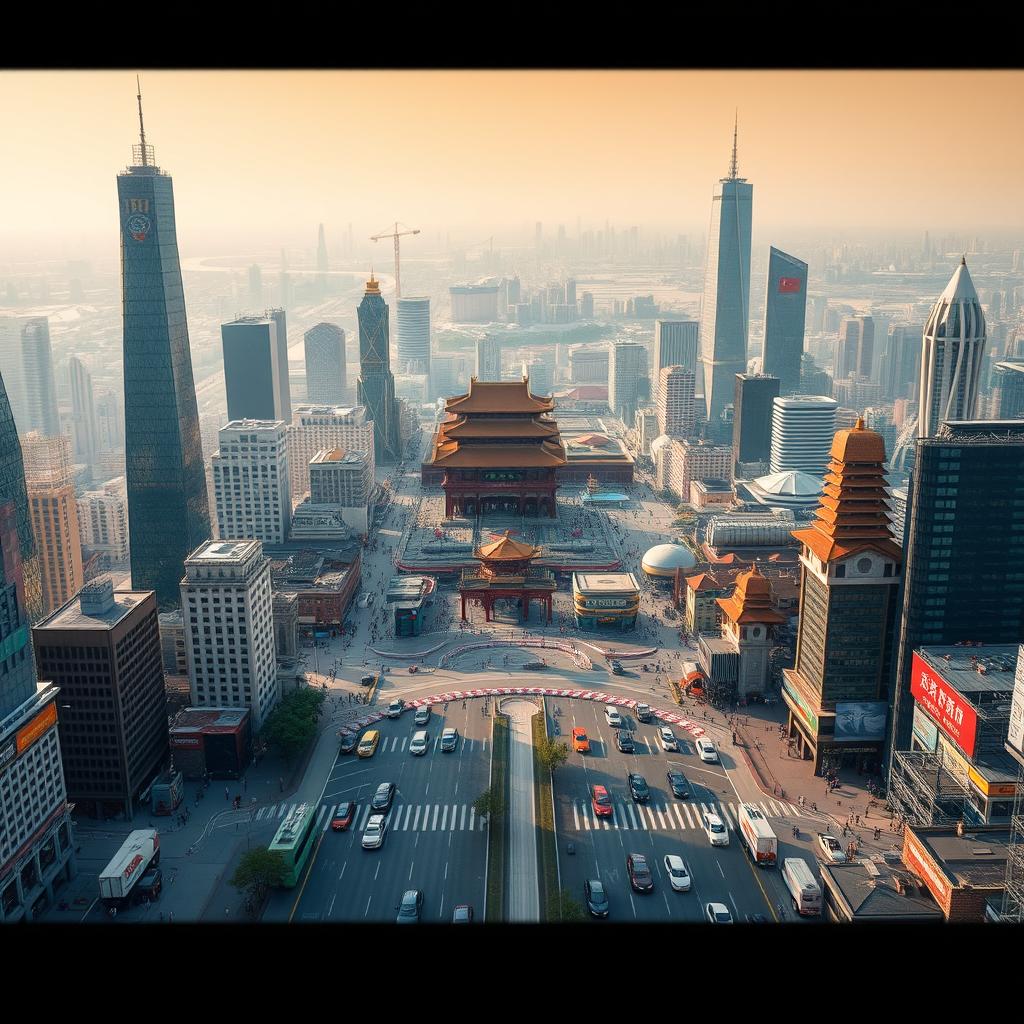China AI: Powerful Growth, Innovation, and Impact
13 min read
Table of Contents
By 2030, artificial intelligence could add $600 billion to the economy each year. This shows the big goals of a major player in the tech world.

The fast growth of AI technologies is changing industries and economies everywhere. China aims to lead in AI by 2030. This will bring big changes and new ideas to the world.
The world is watching as the benefits and global effects of this tech boom grow. It’s setting the stage for a new era in technology.
The Evolution of China AI: 2020-2025
Between 2020 and 2025, China’s AI scene has changed a lot. This change came from big investments and new tech. Now, China is a big player in AI, with over 4,500 AI companies in 2024. This makes up 15% of the world’s total.
Key Market Statistics and Growth Trajectory
China’s AI growth has been amazing. In 2023, private investment in generative AI was $650 million. By 2024, it jumped to around $3.15 billion. This big increase helped AI companies grow in many areas.
Investment Figures and Funding Rounds
More money going into AI shows people believe in China’s AI future. Startups got a lot of money from investors. This shows big trust in AI’s power.
Sector-by-Sector Growth Analysis
Not all sectors grew the same. Healthcare and manufacturing saw big steps forward with AI. AI diagnostic tools and predictive maintenance are now common.
Transformative Technological Milestones
2020 to 2025 was full of big AI tech wins in China. Improvements in natural language processing and computer vision stood out. These helped make AI smarter and more useful.
These tech wins put China at the top of the AI world. They also opened doors for more innovation and growth.
Government Policies Shaping China’s AI Landscape
Government efforts have been key in China’s AI growth. The Chinese government has set policies to boost AI innovation and use. This has made China a top player in artificial intelligence worldwide.
The New Generation AI Development Plan Implementation
The Next-Generation AI Development Plan started in 2017. It’s a key part of China’s AI strategy. The plan focuses on AI self-sufficiency and innovation hubs, aiming for AI leadership by 2030.
2025 Strategic Goals and Benchmarks
China has big AI goals for 2025. It wants an AI industry worth over $150 billion and to develop key AI technologies. These targets are part of the Made in China 2025 plan, highlighting the need for tech innovation.
Local Government Initiatives
Local governments in China are also supporting AI. They fund AI startups, create AI innovation zones, and offer AI training. These efforts have helped China’s AI scene grow fast.
Regulatory Framework Evolution and National Standards
As China’s AI industry expands, a strong regulatory framework is needed. The government is setting national AI standards. This ensures AI is developed and used responsibly.
Updating these regulations is vital. It helps keep public trust in AI and keeps China’s AI industry competitive globally.
Leading Chinese AI Companies Driving Innovation
China’s AI scene is filled with tech giants and new startups. These players are pushing tech forward and shaping the future.
Tech Giants: Baidu, Alibaba, Tencent, and ByteDance
At the heart of China’s AI boom are giants like Baidu, Alibaba, Tencent, and ByteDance. They’re crafting advanced AI models and pouring money into research.
Flagship AI Products and Services
These giants have launched key AI products and services. Baidu’s ERNIE Bot is a hit, and Alibaba’s City Brain is changing city management. Tencent’s AI healthcare is bettering patient care, and ByteDance’s AI media tools are changing how we make content.
- Baidu’s ERNIE Bot: A cutting-edge language model
- Alibaba’s City Brain: An AI-powered urban management system
- Tencent’s AI-powered healthcare solutions: Improving patient care
- ByteDance’s AI-driven content creation tools: Revolutionizing media production
R&D Investments and Patents
These giants are also big on R&D and patents. Baidu has filed over 1,000 AI patents, and Alibaba has spent $15 billion on R&D in a year.
- Baidu: Over 1,000 AI-related patents
- Alibaba: $15 billion R&D investment
- Tencent: Significant advancements in AI research
- ByteDance: Emerging as a leader in AI innovation
Rising AI Startups Reshaping the Ecosystem
New AI startups like Moonshot AI, Minimax AI, and ZhiPu AI are also key players. They’re creating new AI solutions and drawing big investments.

These startups are not just innovating but also opening up new chances for teamwork and growth. As China’s AI scene keeps growing, we’re in for more exciting changes.
Breakthrough Applications of China AI Technology
The use of AI in China is leading to big changes in many fields. It’s changing how businesses work and opening up new chances for growth.
Healthcare and Precision Medicine Advancements
AI is making a big impact in healthcare in China. For example, MedGPT AI Doctor by Yilian can match the skills of human doctors. This makes diagnosis more accurate and faster.
Key advancements include:
- AI-assisted diagnosis for early disease detection
- Personalized treatment plans based on patient data analysis
- Streamlined clinical workflows through automation
Smart Cities and Urban Management Systems
AI is helping make cities in China smarter and more sustainable. It’s used with IoT devices and data analytics to improve traffic, energy use, and safety.
Notable applications include:
- Intelligent traffic management systems to reduce congestion
- Smart energy grids for efficient distribution
- Enhanced public safety through AI-powered surveillance
Manufacturing Automation and Industry 4.0 Implementation
China’s factories are changing with AI and Industry 4.0. AI makes production more efficient, cuts costs, and boosts quality.
- Increased productivity through automated processes
- Improved product quality through AI-driven quality control
- Reduced operational costs through optimized resource allocation
China’s AI Research and Innovation Ecosystem
China’s AI scene is buzzing with activity. It’s where academia and industry work together closely. This teamwork is pushing the boundaries of chinese ai technology. It’s making China a top player in AI innovation worldwide.
University Contributions and Academic Publications
China’s top universities are leading the AI charge. They publish top-notch research and drive new ideas. Tsinghua University and Peking University are among the leaders.
Leading Research Institutions and Their Focus Areas
- Tsinghua University: Focuses on AI applications in healthcare and intelligent systems.
- Peking University: Emphasizes research in AI algorithms and natural language processing.
International Academic Collaborations
Chinese universities are teaming up with others globally. This boosts the worldwide reach of their research. It also speeds up AI progress.
Public-Private Research Partnerships and Innovation Hubs
The Chinese government has set up many innovation hubs. These hubs and partnerships help ai startups in china. They offer support and funding for new ideas.
These partnerships focus on AI in manufacturing, smart cities, and healthcare. By working together, they’re making big strides in AI tech.
Global Impact and International Relations
China’s approach to artificial intelligence is changing the world. Its AI research and applications are making waves globally. This is shaping global politics and transforming the technology landscape.
US-China AI Competition and Cooperation Dynamics
The US and China have a complex relationship in AI. They compete but also work together on some projects. This mix is driving innovation.
Technology Transfer and Trade Policies
Technology transfer and trade policies are key in the US-China AI scene. China’s Belt and Road Initiative (BRI) is helping export AI tech. It’s also spreading Chinese AI standards.
Strategic Implications for Global Tech Leadership
The US-China AI rivalry has big implications. It could change who leads in tech globally. China’s AI progress is shifting the balance of power.
China’s AI Influence in Developing Markets
China’s AI reach goes beyond developed countries. It’s making a big impact in developing nations too. The BRI is helping spread Chinese AI tech and standards.
Belt and Road AI Initiatives
The BRI is key to China’s AI influence in developing markets. It’s integrating AI into projects. This opens up new tech cooperation and development chances.
Technology Export and Standards Setting
China is exporting AI tech and pushing its standards worldwide. This is important for global AI standards and future cooperation.

China’s AI growth is making its global impact and international relations key topics. The balance between competition and cooperation with countries like the US will shape AI’s future.
Economic Transformation Through Chinese AI Technology
Chinese AI technology is changing the country’s economy. It’s making different sectors more productive and opening up new ways to grow the economy.
Workforce Evolution and New Employment Opportunities
The rise of Chinese AI technology is changing the workforce. It may take over certain roles, but it’s also opening the door to new opportunities. New roles are emerging in AI training, ethics, and governance, needing people with special skills.
GDP Contribution and Cross-Industry Economic Impact
Smart technologies are expected to boost China’s economy by $600 billion annually by 2030. It’s changing many sectors, from making things to services.
Manufacturing Sector Transformation
The manufacturing sector is changing a lot thanks to Chinese AI technology. Smart factories with AI machines are making things faster and cheaper. This is helping the economy grow.
Service Industry Disruption
The service industry is also changing with AI. It’s used in customer service, finance, and healthcare. AI chatbots and virtual assistants are making customer service better. AI analytics help businesses make smart choices.
Ethical Challenges and Societal Implications
The AI industry in China is growing fast. But, it brings up big ethical and societal questions. It’s important to tackle these issues for the future.
Data Privacy Frameworks and Security Protocols
China is working hard on data privacy and security for AI. They have rules like the “Interim Measures for the Management of Generative Artificial Intelligence Services.” This helps keep AI fair and data safe. Key points include:
- Data minimization: They only collect what’s needed.
- Consent mechanisms: Users need to give clear permission before their data can be collected or used.
- Security protocols: They use strong ways to protect data.
Addressing Algorithmic Bias and Ensuring AI Fairness
AI can sometimes be unfair. China is working to make AI fair. They’re doing this by:
- Creating diverse training datasets to reduce bias.
- Using bias detection tools to find and fix biases in AI.
Regulatory Responses to Ethical Concerns
China’s government is making laws to handle ethical issues. These rules help keep innovation safe for society.
Industry Self-Regulation Efforts
The AI industry in China is also setting its own rules. Companies are making their own ethical guidelines. This ensures AI is developed responsibly.
Conclusion: The Future Trajectory of China’s AI Sector
China’s AI sector is set to grow even more, thanks to government support and innovation. The Chinese government has helped a lot by making policies that support AI. This has made it easier for AI to develop in the country.
The future of AI in China will see big improvements in technology. This will make things more efficient in healthcare, manufacturing, and managing cities. These advancements will help China become even more productive.
As AI in China keeps getting better, it will have a big impact worldwide. The competition and cooperation between China and the US will be key in shaping the global AI scene. This will affect how countries work together and interact.
With more AI technology being used, there will be new chances for the economy and jobs to change. But, it’s important to handle the ethical and social issues that come with AI. This will help make sure AI is developed in a responsible way.
FAQ
What is driving China’s AI growth by 2025?
China’s AI growth is fueled by big investments and government support. Tech giants like Baidu, Alibaba, Tencent, and ByteDance are leading the way. Startups are also playing a big role.
What steps has the Chinese government taken to boost its tech development?
The Chinese government has set up plans and policies to boost AI. They have also helped with local initiatives and updated rules to support AI growth.
What are some breakthrough applications of China AI technology?
China’s AI is making big strides in healthcare and smart cities. It’s also changing manufacturing with Industry 4.0. These advancements are making things more efficient.
How is China’s AI research and innovation ecosystem contributing to its growth?
China’s AI growth comes from universities and research partnerships. Top research centers are working on key areas and teaming up with others worldwide.
What is the global impact of China’s AI advancements?
China’s AI advancements are making waves globally. They are competing and working together with countries like the US. They are also helping developing markets with technology and partnerships.
How is Chinese AI technology transforming the economy?
Chinese AI is changing the economy in big ways. It’s evolving the workforce and boosting GDP. It’s having a major influence across a wide range of industries.
What are the ethical challenges associated with China’s AI advancements?
There are ethical issues like data privacy and bias in AI. The industry and government are working on solutions. They are setting rules and improving security.
What is the future trajectory of China’s AI sector?
China’s AI sector is set to keep growing. It will be driven by government support, innovation, and investment. There will be challenges and opportunities as it grows.
How will China’s AI advancements impact the global tech industry?
China’s AI will have a big impact on the global tech scene. Its tech giants and startups will lead innovation. They will compete and work together with others, shaping AI’s future.
Reader Ratings & Reviews
There are no reviews yet. Be the first one to write one.
